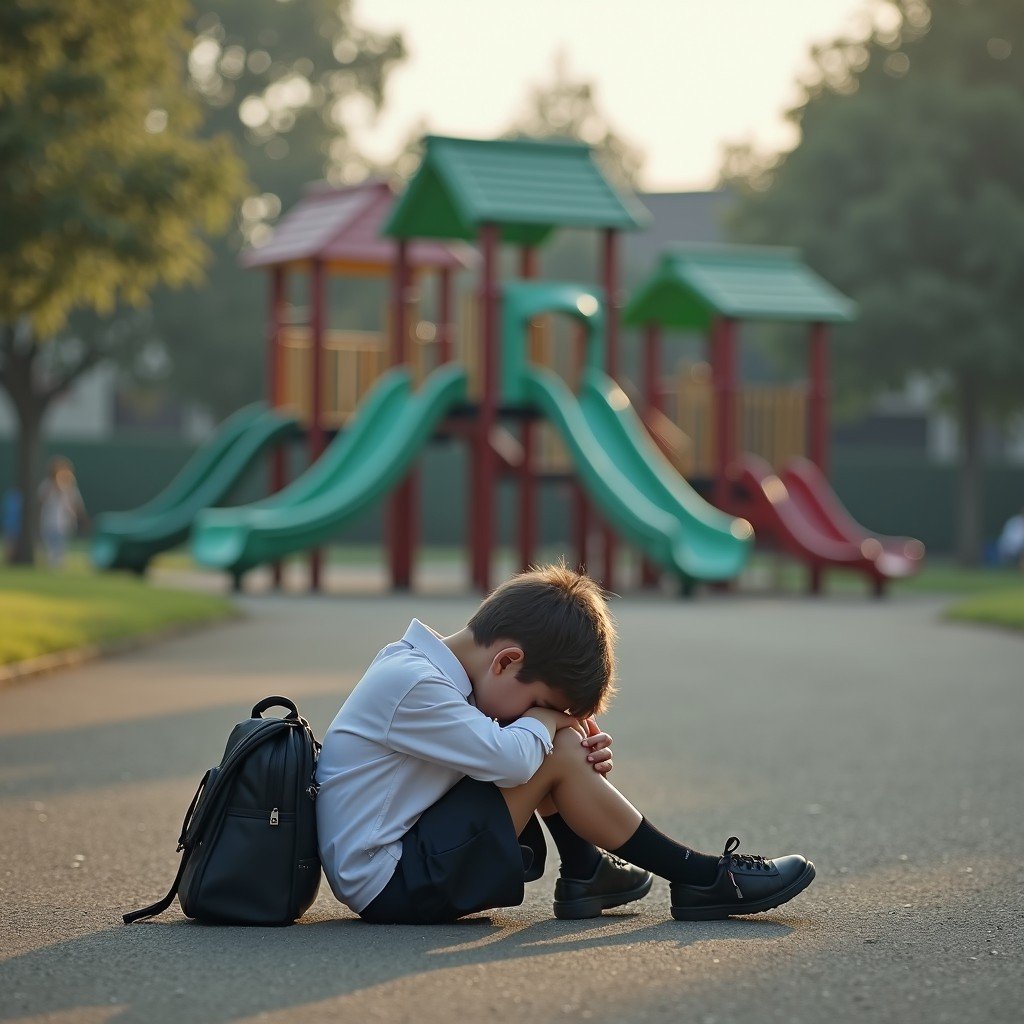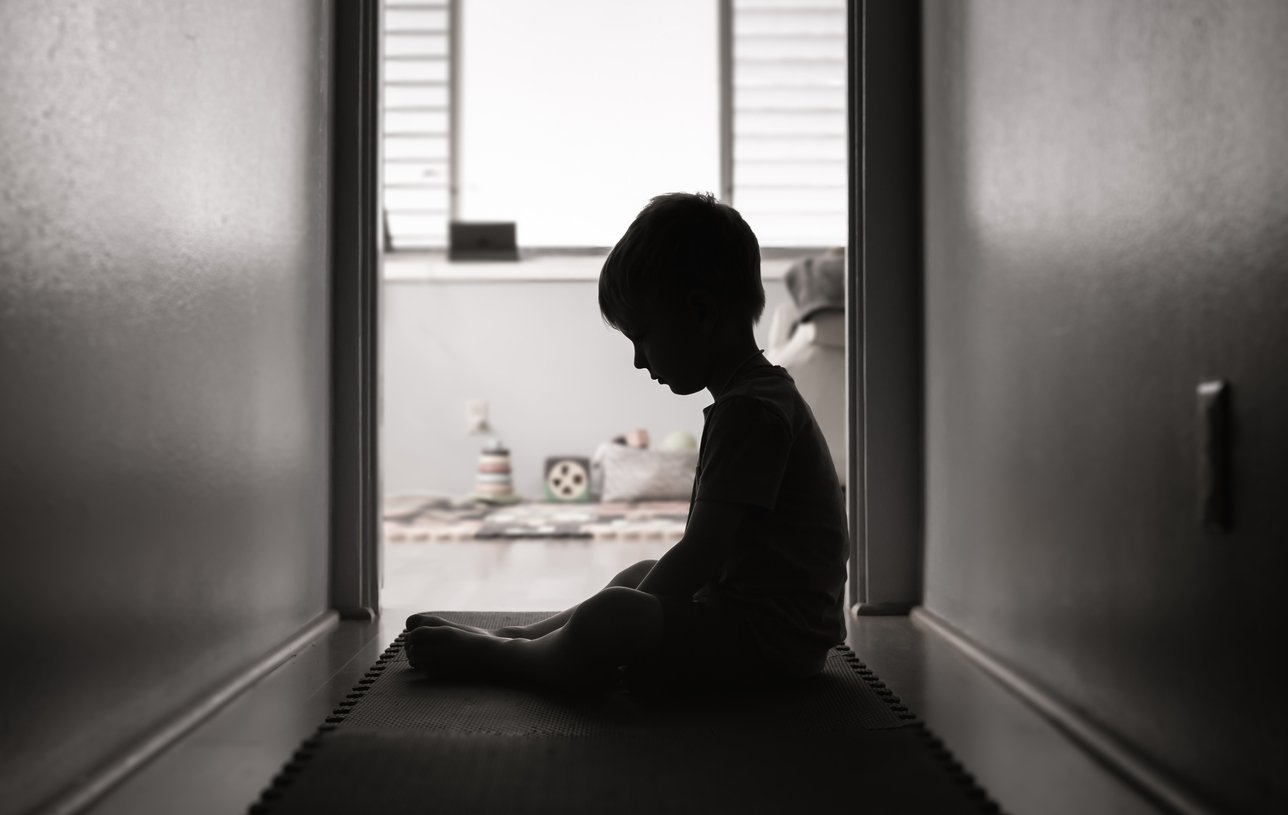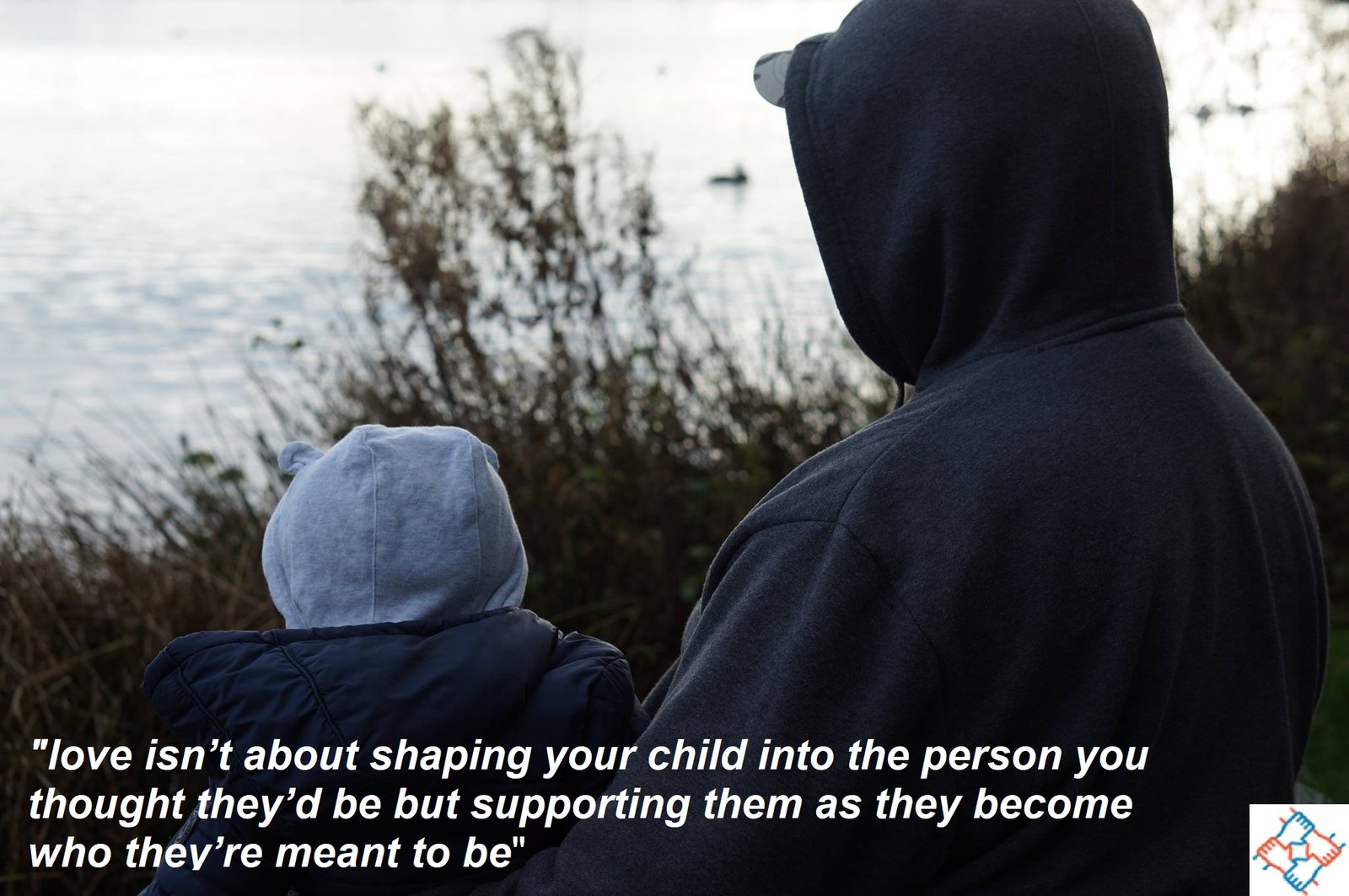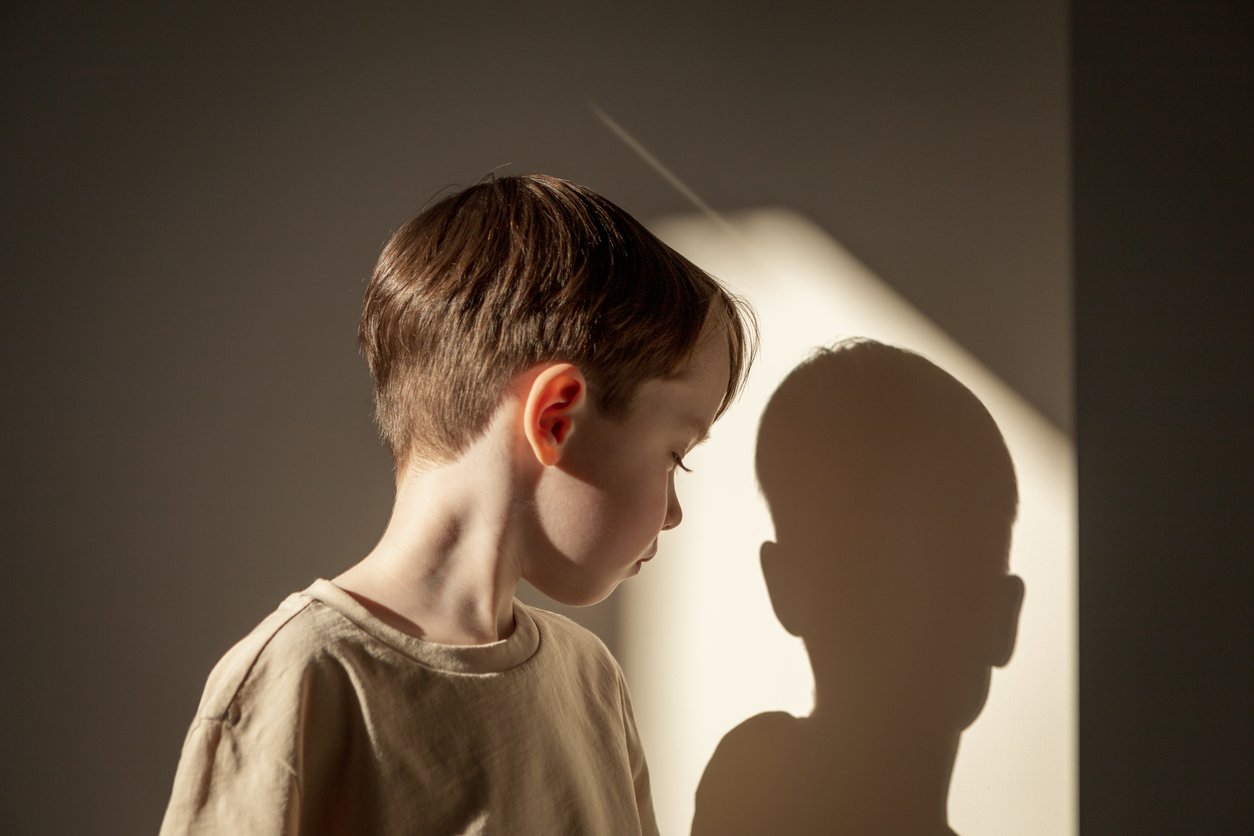I am very aware that this can be a difficult day for many and, if this is you, my thoughts are with you . My son has just given his dad the card and presents, wished him a Happy Father’s Day and then they both went off to do their own thing. This interaction is never quite how I would hope (filled with and ) but I have to remind myself that is what I want and not what they are! They love each other dearly but it can be a rocky ride at times. My own family dynamic can sometimes create challenges, frustration and friction between myself and my partner. I end up doing the lion’s share of the work around the SEN journey while he takes a back seat and lets me get on with it. I often feel resentment about this, but I do have to remind myself that, however hard I find it, he also struggles too but in a different way. I am also somewhat of a force when it comes to my son, so I have to be conscious of that too! I remember reading something recently that really hit home for me. It went something like this: Traditionally, a father’s role in parenting has been to prepare a child for adulthood, teach them life skills and get them ready for ‘the real world’. A mum might take more of a role with supporting, nurturing and helping with emotional development. (Please don’t berate me for being in any way sexist – there is a long evolution of these roles and they are changing, but it has been this way for a long time and change does not happen overnight.) For some SEN children, the preparation for adulthood may need to take a backseat and they may need more nurturing, emotional support and parenting in a way that has traditionally been the role of a mum. So, this can lead to a dad feeling a little bit lost, redundant and rejected. I am painfully aware of this in my own situation. Sometimes (but not always), dads might struggle more than mums with being a parent of a child with special educational needs (SEN) due to several factors: These factors, combined with the unique pressures of each family’s situation, can contribute to why dads might, in some situations, find it challenging in these circumstances. DISCLAIMER: This does not apply to everyone. This is meant in the nicest way possible and is not at all about blame or in any way being derogatory about dads! It’s just some people’s reality and important to acknowledge.
The Weight of Expectations
I first learnt about pathological demand avoidance when my son was 7. At that time, I was struggling with his behaviour. For his dad, his grandparents, at school and with pretty much anyone else, he was mostly compliant, well behaved and ‘toed the line’. For me, he would push every boundary. Of course, I heard many times that the problem was me. I was too soft, I didn’t discipline enough, his behaviour was my fault. I often doubted myself, believing these words, thinking I was a terrible mum, unable to effectively parent my boy. But, in the moments of clarity, I would always tell myself that I was parenting my son in the way he needed. I allowed him choice, autonomy (within reason) and gave him a voice. He has strong opinions, and I allowed him to share these, be heard and have the respect he deserves. I never felt the ‘behaviourist’ approach was right for my son. It was never a conscious decision, more of an instinctual one. When I started to read about PDA, it triggered memories of him being 2-3 years old. I would pick him up at the end of a long day at nursery. The reports were varied; ‘he could not sit still; he did amazing today; he got into a fight with another child; he made a fantastic Lego creation; he argued with the adults because they put his friend in a timeout that my son did not agree with’. But regardless of how the day had been for him, I would be faced with the same routine. I would get his coat on and take him out to the car where the battle commenced. As I tried to get this tiny boy into his car seat, he would start to fight – punching, kicking, biting, back arched and resisting being strapped into the car for the 10-minute journey back home. Night after night I would stand alone in that car park, sobbing, broken and wondering why my son hated me. The more I learned about autism and PDA, the more it all began to make sense. In those moments in the car park, he was dealing with the overwhelm from a day plagued with noise, lights, smells and demands. Along came his safe person and he would unleash the pent-up frustration from a day spent with a barrage of sensory overwhelm. Looking through the PDA lens, so much started to make sense. As my son has got older, taller and stronger, so has the PDA. He could no longer continue with the onslaught of constant demands at school. He could no longer hide behind the mask he presented to the world. He now lives in a state of anxiety. The thought of getting dressed overwhelms him. I can see the panic in his eyes when he knows we must leave the house. Every expectation we have of him now needs to be framed in such a way as to not trigger the anxiety that is constantly sitting just below the surface. This week, I planned a 2-day trip away to Manchester, only an hour away from home. Legoland Discovery, Chaos Karts, Pizza Hut and The Museum of Illusions. Four things that my son would absolutely love and one night away in a nice hotel, just the 2 of us. The whole experience was planned around him and his interests, what could go wrong? I was excited. It’s not often that I get the opportunity to give all my attention to him without the distractions of work, home, family, housework and the constant battle for support … This was going to be an amazing time making precious memories with my precious boy. I had high expectations. However, I had completely forgotten the cardinal rules of parenting a PDA child! In my excitement to spend quality time with him, I made all the rookie mistakes of someone who does not know about PDA. As I talked about what we would do, the fun we would have and the memories we would make, inside my son the weight of expectation and demands was building. A silent war was being raged within him. He wanted to do these things, be with me and have fun, but it had now become a demand on him to do so. As the day arrived to go, the walls came up. He didn’t want to go. He wanted to stay home. He didn’t want to get dressed. He couldn’t brush his teeth. He could not tolerate the socks on his feet. My heart was breaking as my dreams of the perfect trip away slipped away. The reality of what I had done came crashing around me as I stood, looking at my son who, despite knowing we were going to do all the things he would love, could not, in that moment, tolerate the demands I had now placed upon him. We did go away. It was not the fun packed experience I had hoped for. We didn’t manage to do everything I had planned. My son had little moments of happiness, but also many moments of anxiety and overwhelm. I learnt a huge lesson. I must remember the weight of expectations that my son carries. If he is told to have fun, this becomes a demand and makes it far less likely that he will have fun. During our time away together, my son hung off me, jumped on me, squeezed me, and bit me (gently and without malice – one of his ways to regulate right now). If anyone was observing us, they would have seen him punch my arm many times or squeeze me as hard as he could. If they saw my face, they would notice how I would wince and try to hide the pain I was feeling. They may have looked and judged us and wondered ‘why is that mum letting her son get away with hurting her? She needs to discipline that boy’.
We Know You, We See You & We Hear You
We hear you. Every day, we listen to your world – the things you say, and the things you don’t. We are on alert, listening and attuned trying to anticipate and respond. We know you; we see you and we hear you sweet child.
We know the seams in your socks are unbearable. They feel like tiny wires pressing against your toes, even though we can’t feel them ourselves. How can we help? Let’s try new socks. You don’t like them? OK, we’ll look for something else.
SHARING THE OTHER SIDE OF MY STORY – A DAD’S VIEW
INTRO FROM SAM I have previously shared insights into my personal journey since my son hit burnout. It has been heart-breaking, frustrating and exhausting, not unfamiliar to many of you. There have been several times this year where my partner and I have had strongly opposing views on how we should parent and support our son. It has nearly broken our 22-year relationship. I am acutely aware that there are many relationships that have been torn apart by the immense pressure of the SEN journey. As I considered some of these difficulties this week, I asked my partner, Tony, if he would share his experience and give the other side to my story. He is not on social media, but he agreed to write to you all this week and give an insight into a dad’s view. I hope this reaches the dads in the group, an underrepresented voice but no less important. I also hope it reaches those that may be facing similar difficulties in your own relationships. Without further ado, I present to you the words of the man that has been my anchor for the last 22 years and who, despite the many challenges we have faced, remains steadfastly ‘my Tony’… Over to Tony – Steps in the Direction of Understanding After a decade together, our family felt incomplete, so we made the decision, somewhat late in life, to have a child. When my son was born on a Friday night, by emergency C-section, I was handed him—wrapped, hatted, and tired out. He gripped my little finger in his tiny hand and fell asleep. In that moment, I felt the deepest pride any father could know. He was healthy and strong—the embodiment of everything I could have hoped for. I looked at him and saw not just the boy he was, but the man I thought he would become: kind, successful, and full of limitless potential. In the early years, everything seemed to unfold as expected. He was quick to learn, inquisitive, and sharp. He loved me to read my favourite poem ‘If’ by Rudyard Kipling at bedtime. One night, I skipped a line by accident, and his small voice recited the missing words. That’s when I realised, he had been memorising those words that I had recited night after night. By four years old, he could remember nearly the entire poem, and we proudly showed off our party piece to family while on holiday. I felt like the world was still wide open for him, with all the potential I had dreamed of. Then, at age seven, came the autism diagnosis. There were plenty of signs leading up to this, and the picture I’d painted in my head had already begun to shift. But accepting the diagnosis wasn’t hard. Autism, I thought, is just another part of him—another path, but nothing too serious. After all, it’s a spectrum. My son was still brilliant in his own way, and we’d walk this road together. I thought we’d adapt, learn a few new strategies, and he’d continue to grow strong and capable, just as I’d always imagined. But as time passed, his differences became more apparent. It wasn’t the “lighter” version of autism I had initially hoped for—it was more involved. His behaviour began to deteriorate in ways I couldn’t understand or allow. What started as a few challenging moments turned into daily struggles—refusal to comply, defiance, and what I now realise was his overwhelming need to control everything around him. We fought more often—not just him and me, but all three of us. Sam and I, once proud of our united approach, found ourselves at odds on how to parent this boy we loved so much but were finding harder and harder to reach. I used to joke that you had to tell him something at least 1,000 times before it would sink in. I constantly reminded him that “because I said so” was all the justification he needed to do something. I developed a mantra: “Straight away, as fast as you can, without arguing or paddying.” It became my internal compass, but it never seemed to guide him. Every request felt like a battle, as though at nine he was already a sulky teen. Things escalated at school, and the Pathological Demand Avoidance (PDA) that Sam had long suspected started to emerge stronger. To me —at first, it sounded like woo-woo nonsense, a label applied post hoc to excuse bad behaviour. It didn’t help that PDA wasn’t recognised in the DSM, the diagnostic bible we lean on to make sense of what’s real and what’s not. I resisted the explanation, clinging to my belief that discipline was the answer. If we were just consistent enough, firm enough, he would have no choice but to comply, follow rules, and behave as I expected. The more Sam tried to nurture and comfort him, the more I felt my approach was losing ground. When it was just me and my boy, he complied—reluctantly, yes, but he complied. I took that as evidence my stricter approach was working. I thought my Sam’s softer, more nurturing ways would undo the discipline I was trying to instil. She was always the good cop, so my cop had to get worse and worse to be effective. He learned he only had to withstand my telling-off for long enough, and she would step in. I believed if only we were united, we could “fix” this behaviour. But the harder I pushed, the worse things got. I argued with him. I argued with Sam. And I second-guessed myself. Surely this was just a matter of discipline. Surely, he was just being difficult because he wanted to be. If I layered consequences and punishments high enough, eventually, he’d get with the program. Right? But nothing changed. If anything, it got worse. The only thing that became clear was that I couldn’t control this with sheer force of will. My frustration wasn’t solving anything, and neither was my
THE SYSTEM IS BROKEN, NOT YOU
Do you still remember that first day of school for your little one? You dressed them up, ready to embark on their school journey, forced them to stand and smile for pictures. You may have joined the legions of other proud parents and posted on Facebook to memorialise that first day of school to look back at in years to come. Didn’t they look soooooo cute on their uniform? At that time, their whole life was stretching out in front of them. We all start this journey with a dream. A vision of school as a magical place where our children are welcomed, supported, and understood. Where teachers are armed with endless patience, the curriculum bends to fit the child, and every day ends with your kid coming home smiling, proudly holding up their latest masterpiece or the headteachers award for being an amazing tiny human. We envision playtimes with our little people happily running around with their friends playing tig, skipping or playing What Time is it Mr Wolf. School – the great sausage machine of society! A place where “attendance is everything” (because nothing says wellbeing like dragging a child in kicking and screaming for the sake of a ticked box), academic achievement reigns supreme (so long as your child fits neatly into their one-size-fits-all test), and sanctions are handed out like sweets at a party—just without the fun. Behaviour policies are all about rewarding conformity and punishing individuality, as though turning out perfectly identical kids is the gold standard. If your child dares to think differently or struggles to sit still for six hours straight they MUST be sanctioned. After all, how else will they become perfect little sausages ready to be packaged and sent off into the world? Sure, the machine wasn’t built for our SEN kids, but we are not here to make sausages—we’re here to build masterpieces. The system is broken. It’s a tangled mess of red tape, contradictory policies, and phone calls that always seem to end with “I’ll get back to you” (spoiler alert: they won’t). But here’s the thing: you’re not just navigating this mess – you’re winning. Every email you send, every meeting you attend, every fight you fight – it all matters. You’re not “THAT parent” because you wanted to be. You’re “THAT parent” because the system made you. On those days where you are starting to consider, as others have been telling you, that YOU are the problem, shake this right off! Think about your wonderfully unique and amazing child. Are they sausage shaped? I would suspect not . Remind yourself that your child is not a sausage – they are a fillet steak, a watermelon, a cauliflower or a delicious lemon meringue pie (OK… I have gone too far with this analogy now!). Here’s the thing: you’re not failing; you’re innovating. Every time you push back on an unfair decision, you’re teaching the system a lesson it desperately needs to learn. Every time you advocate for your child, you’re not just rewriting the rules; you’re tearing up the old manual and handing it back with a “Nice try, but must do better.” Don’t be scared to get out your red pen and give the school a big fat . You are a SEN parent . You have dealt with sleepless nights, meltdowns, anxiety, assessments, parent blame, odd looks from strangers. You have fought battles that only another SEN parent can understand. You are not just a parent – you’re a teacher, a therapist, an advocate and sometimes a detective (because finding out what is really going on with your little one takes Sherlock-level skills). So when you have to face that meeting with the SENCO, head teacher or go to mediation with the LA, step back and look at all the skills you have acquired. They may appear to have your child’s life in their hands, but you have all the power that comes with being a SEN parent . So when the system feels impossible, just remember – you’ve already conquered the unimaginable. And that, my friend, is why you are unstoppable. Disclaimer: Not all schools are sausage factories. Some are like artisanal bakeries—crafting unique, bespoke buns with care. This is a generalist view and may not reflect your experience. If your child’s school is already amazing, please keep it up and send us their secret recipe!
Giving up the guilt
As I sit here, 1,191 miles away from my son, I am filled with a sense of peace and gratitude. Before I came, I felt an immense and crushing guilt about leaving him. He has been anxious about me going, begging me to stay with him. I am choosing in this moment not to let that guilt linger. I am very blessed that I have this opportunity to spend a few short days in Portugal with my dad and stepmum. I am here to check in on my daddy who had an operation recently to repair a broken collarbone (some say he should not have been whizzing round Vietnam on a motorbike in his 70s, I say I am very proud of his adventurous spirit and energy levels that put me to shame!). Anyway, here I am, waking on my first day to glorious sunshine, warm weather and a sense of peace I have not felt for some time. I do not take this short break for granted. I know of many members who need this even more than I do. I truly wish I could bring you all with me and give you a slice of peace that you all deserve so much. So, I have been thinking this morning about what I could write about that might bring you a little bit of peace and I have landed on encouraging you to let go of your guilt. When you become a parent, there are lots of things you are warned about – sleepless nights, your social life has ended, projectile vomit, terrible twos, disgusting nappies and so much more. What I was not prepared for was the crushing guilt that came with being a parent. Am I a good enough mum? Am I the reason he is like this? What am I doing wrong? Why is my son the only one wearing his PE kit on school photo day (I will blame that one on my own ADHD!)? This list of reasons to feel bad about yourself can be endless and it can create a sense of unease, impact your mental health and leave you doubting yourself as a parent. Layer onto this being a SEN parent and you must also contend with the parent blame, referral to parenting courses and the constant disbelievers who leave you doubting yourself. As if that isn’t enough, the most crushing guilt can come when you start to think: I just need to get away from my child I need some time for me I have lost who I am because of my child I love my child, but I wish the situation was different I feel trapped I can’t cope anymore These are the thoughts that many do not dare to utter, feeling it may reflect badly, make them sound like they don’t love their child or make others think badly of them. Well, I am telling you now that it is OK to have these thoughts and there is absolutely no reason to feel shame or guilt. In SEN Parent Support group, we do not judge, we understand. We do not shame, we feel the pain with you. So here goes on how I truly feel about my own situation: Writing this here, I do not feel guilt about having these thoughts. I did not sign up for this. I never imagined this would be our reality. I had envisioned a child who would excel at school and have a bright future filled with happiness and contentment. I sometimes grieve for the lost dreams of our family and that is OK. I am not a bad mum to wish that our life was easier, I am just human after all (with a sprinkle of superhuman of course, because I am a SEN parent after all!). Today I encourage you to think hard about whether you are carrying the burdensome weight of guilt with you. Is it weighing you down? Are you doubting yourself or having thoughts that you do not share in case you are judged? If yes, how can you release these? You could speak to a trusted friend, write them down in a journal, share them with us or even write them on a piece of paper then rip it into tiny pieces and see all your guilt torn up. There really is no need to carry this around with you my lovely member. After all, you too are human (with just a little sprinkle of superhuman). As I sip my coffee, bathed in the golden glow of the Portuguese sun, and looking over the coast of the Algarve, I’m reminded of one final truth: guilt may be part of parenting, but so is resilience. So here’s to letting go of that crushing weight, finding peace in the chaos, and—most importantly—embracing the fact that it’s perfectly acceptable to need time away for yourself… in fact it is essential to recharge the batteries that our little munchkins drain with their persistent whining, constant demands and, for some, their instance that you make every demand into some awful gamified version to hide the fact you just want them to brush their blooming teeth! Now, if you’ll excuse me, I’m off to remind my dad why playing football and a broken collarbone don’t mix—right after I convince him that a zip-lining tour isn’t “just a gentle ride through the trees.” Some battles we fight for our children, others for our parents, but either way, we deserve a laugh along the way. 
Your today is not your tomorrow
When we hold our tiny humans for the first time, our hearts burst with the anticipation of what is to come and the life that stretches ahead for our family. We hope our children live a life of happiness. We are ambitious for their future, wanting to create a life of opportunity where our children can fulfil their dreams. In those first years, our hearts swell and we dream big. For a SEN parent, those dreams may start to fade or shift as the years go by. We may notice our child is struggling to socialise or communicate. They may have difficulty with learning. They may find the world around them overwhelming and instead prefer the solitude of a safe space. We had a plan. We had seen a path ahead for our child: play school friends college university work marriage Yay, we can have grandchildren! As we start to notice their difficulties, our own anxiety can start to encroach as our world view shifts. Our child struggles to play and they struggle with school – how on earth will they fulfil everything else we had dreamed of if they cannot get past the first 2 steps of our plan?! We start to feel overwhelmed as we worry about the rest of their life and what their future will be. We wanted them to thrive, but they may be barely surviving. Our hopes and dreams for our children are crumbling and we feel the weight of their entire lives crashing down on us. We no longer have the certainty of the path we were following. The journey ahead is now unknown and filled with uncertainty. Our reality can now start to weigh so heavily on us that our own mental health is impacted. We cannot understand what our child’s life will be anymore. It was so clear to us but now as we look into the future, we only see a life of challenge and struggle because that is what they are facing right now. We need to rewrite their future, but there is no clarity and our struggles here and now are clouding the future possibilities. This may sound familiar to some other SEN parents, and it has been the reality for me and Tony. We used to joke that our son would be the first ever President of Earth. He would bring about world peace. He would end poverty and cure cancer. He would invent warp drive and travel to far distant planets (he is named after a Star Trek character after all – no it is not Spock!). As our son’s strengths and personality started to shine through, it became clear that he had an amazing brain, huge potential and a natural ability to piece puzzles together. Our little engineer started to emerge. We saw a future where he was an engineer or an architect, an inventor and a creative problem solver (probably a more realistic dream that President of Earth!). When he hit burnout earlier this year, all those dreams vanished. He could not attend school. This meant that he can’t do his SATs. He would lose all his friends. He can’t go to secondary. He won’t be able to sit GCSEs. He can’t do A-levels. He won’t go to university. He won’t meet the love of his life and get married. All of a sudden, we were not having grandchildren because our son could not cope in school. At 9 years old, our son’s entire future was in question. I realise now that it is somewhat silly for us to believe that our son’s entire future is at risk just because he cannot cope with the demands of school right now. The more I have explored and understood the reality of what all of our children are facing in school, the more I have realised that our son is paving the way to a brighter future for other children. He has shown me that the education system is so fundamentally broken for so many of our children that he has ignited a fire inside me to help others, raise awareness and act now to create change. Yes, he is struggling right now. Yes, he is out of school and we have a long and uncertain path ahead of us towards an unknown future, but it will still be filled with happiness, love and opportunity. It will just look a bit different to what we had imagined. Different, not bad. Different, not wrong. As I have come to terms with our situation, I have started to accept and even anticipate our different future. I no longer look with fear, I gaze with wonder at what will come. Sometimes I still feel the weight crushing me, but it is getting easier to shake it off and return to a state of anticipation. What if the very challenges and uncertainty we face right now make my son a stronger, more resilient and better equipped adult for his future? What if the difficulties we are facing are playing a small part in the changing face of education? So, I now like to live in the here and now. I cannot see the clear route for his future, but that can be exciting. He will no longer follow the path I had laid out for him; he will build his own future and I will follow him. He will show me the way and I trust him. Our today is not our tomorrow. I am looking forward to seeing where my boy leads me.
FOR ALL OF OUR KIDS
My son is funny and bright My son is loving and kind My son shines like the brightest light My son has a different mind Not everyone can comprehend The challenges our children face Or that a child who has SEND May struggle to find their place They slip on their mask every day Trying to blend into the crowd Mimicking how other kids play While inside a voice screams so loud ‘This isn’t right, this isn’t me’ But to let the mask slip is scary ‘Can you accept me and just let me be free?’ But they continue to feel wary As, to let the mask go will make them stand out What will others think when they know That they want to jump, flap, spin and shout It’s not ‘acceptable’ for this to show But one day the choice is taken away They no longer have the ability To hold up their mask every day They are now plagued with a fragility Because the strength that was needed To hide the bits that don’t fit Had gradually receded Now they have to admit “It’s too much … it’s too hard Leave me alone … go away I can’t speak, it’s too hard No I don’t want to play Just leave me alone Stop bothering me I want to be on my own I just want to be free I can’t go to school I hate it there They are too cruel They really don’t care” I wish I had seen how hard it was for him I wish I had listened more to what he was saying I didn’t realise that it was so grim I didn’t recognise the price he was paying My son is funny and bright But the light inside him dimmed The day he hit fight or flight If only he could have stimmed I cannot change the past But it will not defeat my boy This feeling he has will not last He will one day feel joy Because together we are finding a way out Where he can be his authentic self He can jump, flap, spin and shout He can leave the mask on the shelf
The Power of Community
When we face the challenges of raising children with SEND, the journey can often feel isolating, overwhelming, and, at times, heartbreaking. But something incredible happens when parents and carers come together, share their stories, and offer support: we build a community that uplifts, strengthens, and empowers each other to face the struggles ahead. Our SEN Parent Support Group has grown to over 15,000 members since its founding by Andrea Dixon-Boldy on February 28th this year and is a shining example of just how powerful such a network can be. The size of our group alone is a testament to both the scale of the SEND issues we face and the deep need for connection and support. More than just a number, every member represents a family navigating a system that can sometimes feel stacked against them. In this group, we have found a place to share our experiences and our heartbreaks, but also our victories and hard-won successes. It is one of the most rewarding things I’ve been a part of, knowing that we are not just providing information but hopefully helping to guide so many families toward a brighter future for their children. None of us should have to walk this path alone. For many of us, there have been dark times this year. I’ve personally felt the weight of those moments when my son hit burnout, and the pain was almost unbearable. But through it all, I found solace in knowing that my experience could help someone else avoid the same heartbreak. That’s the real power of our community: using our own struggles and pain as a source of strength for others. Every shared story, every bit of advice, and every show of solidarity helps ease the burden for the next parent or carer facing a similar challenge. We are, above all else, a safe space. In a SEN world that can sometimes feel harsh and unsupportive, our group stands as a place of refuge. Here, we understand each other without judgment and offer support without hesitation. Our members, no matter where they are in their journey, know that they are not alone and that they have a community of other parents and carers who genuinely care and ‘get it’. But beyond emotional support, we strive to be part of the solution. Awareness of SEND issues is vital, and there are many groups out there raising their voices through petitions and activism, which we applaud wholeheartedly and appreciate the awareness this raises. However, our approach is grounded in empowering parents and carers with the knowledge they need to advocate for their children. We believe that one of the most powerful tools in this journey is understanding the law and your rights. By providing resources for free, we aim to equip families with the knowledge and confidence to ensure that their children receive the support and education they are entitled to. When parents know the law, they are better positioned to stand up for what is rightfully theirs, and in doing so, they pave the way for long-term change. The transformation that happens within this community is profound. Parents come in feeling lost and defeated, but through connection and education, they become empowered and ready to fight for their children’s futures. Together, we are part of something bigger than ourselves, something that extends beyond any one family or child. We are creating ripples of change that will help reshape how SEND issues are approached and understood. It is a journey of shared resilience, hope, and empowerment. And it’s one that I am so proud to be part of. Every day, as we continue to grow, I see the impact we have not just on parents and carers, but ultimately on the children who are at the heart of it all. They are why we fight, and they are why this community exists. This group has become more than a support network – it is a lifeline. For every parent who feels lost in the system, for every child who deserves better, and for every family standing at the brink, we are here, together, to make sure no one is left behind. That’s the power of our community, and that’s the difference we’re making, one shared story, one empowered parent, and one supported child at a time. A HUGE thanks to Andrea for making this a reality and to our selfless team who I love with all my heart both for the beautiful people they are individually and for what they each do to support others despite their own heartbreaking difficulties Crystal Michelle Tracey Hilder Laura McNally Nicola Owen.









